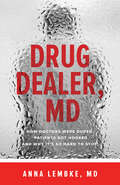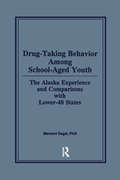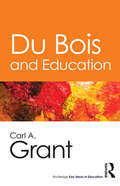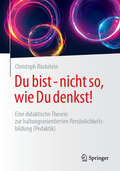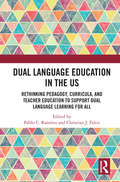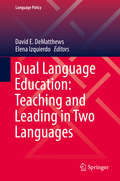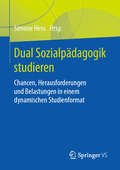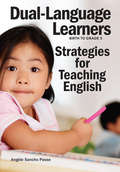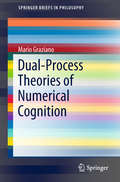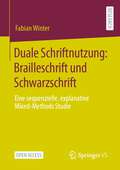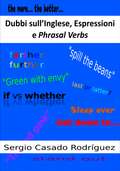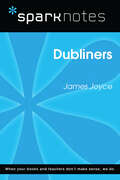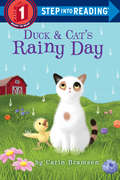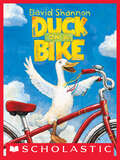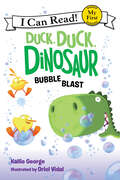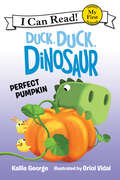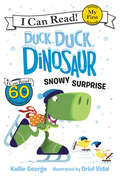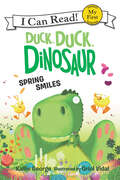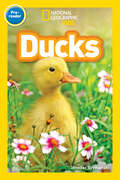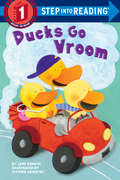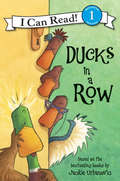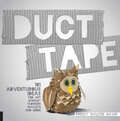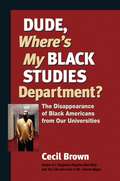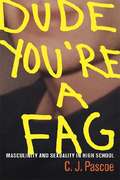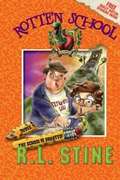- Table View
- List View
Drug Dealer, MD: How Doctors Were Duped, Patients Got Hooked, and Why It’s So Hard to Stop
by Anna LembkeThe disturbing connection between well-meaning physicians and the prescription drug epidemic.Three out of four people addicted to heroin probably started on a prescription opioid, according to the director of the Centers for Disease Control and Prevention. In the United States alone, 16,000 people die each year as a result of prescription opioid overdose. But perhaps the most frightening aspect of the prescription drug epidemic is that it’s built on well-meaning doctors treating patients with real problems.In Drug Dealer, MD, Dr. Anna Lembke uncovers the unseen forces driving opioid addiction nationwide. Combining case studies from her own practice with vital statistics drawn from public policy, cultural anthropology, and neuroscience, she explores the complex relationship between doctors and patients, the science of addiction, and the barriers to successfully addressing drug dependence and addiction. Even when addiction is recognized by doctors and their patients, she argues, many doctors don’t know how to treat it, connections to treatment are lacking, and insurance companies won’t pay for rehab. Full of extensive interviews—with health care providers, pharmacists, social workers, hospital administrators, insurance company executives, journalists, economists, advocates, and patients and their families—Drug Dealer, MD, is for anyone whose life has been touched in some way by addiction to prescription drugs. Dr. Lembke gives voice to the millions of Americans struggling with prescription drugs while singling out the real culprits behind the rise in opioid addiction: cultural narratives that promote pills as quick fixes, pharmaceutical corporations in cahoots with organized medicine, and a new medical bureaucracy focused on the bottom line that favors pills, procedures, and patient satisfaction over wellness. Dr. Lembke concludes that the prescription drug epidemic is a symptom of a faltering health care system, the solution for which lies in rethinking how health care is delivered.
Drug-Taking Behavior Among School-Aged Youth: The Alaska Experience and Comparisons With Lower-48 States
by Bernard SegalUse this valuable knowledge about drug-taking behavior to plan strategies to prevent or reduce drug-taking among youth. The findings from this unique study have important implications for researchers, educators, practitioners, and local and state policymakers and planners for the development of initiatives for addressing smoking, drinking, and drug use among early adolescents and teenagers. The purpose of this informative volume is to further understand drug-taking behavior among adolescents by providing information on the prevalence, correlates, and consequences of drug-taking behavior among a large sample of adolescents. Although the focus is on Alaska, the findings generalize to comparably aged youth in general; moreover, comparisons with findings from national studies and other states provide interesting results.
Du Bois and Education (Routledge Key Ideas in Education)
by Carl A. GrantOne of the most prominent African American intellectuals of the twentieth century, W. E. B. Du Bois continues to influence the understanding of race relations in the United States. In this deeply personal introduction to the man and his ideas, esteemed scholar Carl A. Grant reflects on how Du Bois’s work has illuminated his own life practices as a Black student, teacher, assistant principal, and professor. Sharing the story of a brilliant man’s life contribution to teaching about race and the ideologies and methodologies of racism in education and social and political thought, Grant begins his narrative with a broad overview of Du Bois’s life and scholarship, before turning more specifically to Du Bois’s theory of an educational system. The book concludes with an examination of Du Bois’s curriculum model, predicated upon the work of the NAACP, the Harlem Renaissance, and Du Bois’s own writings, as well as a discussion of the lasting legacy of Du Bois’s educational and social theory in the present day. Ideal for graduate-level courses in curriculum theory, educational foundations, and education history, Du Bois and Education provides an in-depth examination of Du Bois’s scholarship, social criticism, and political thought as they relate to his educational theory.
Du bist - nicht so, wie Du denkst!: Eine didaktische Theorie zur haltungsorientierten Persönlichkeitsbildung (Pedaktik)
by Christoph RöckeleinIn diesem Buch wird die didaktische Basistheorie einer haltungsorientierten Persönlichkeitsbildung in ihren einzelnen Elementen vorgestellt und am Schluss des Buches im Handlungsfeld des haltungsbasierten Coaching gezeigt. Im Kontext der von Christoph Röckelein konzipierten Pedaktik liegt der Schwerpunkt des Interesses auf der Coaching- bzw. der Beratungssituation, also auf persönlichkeitsbildenden Interaktionen. Das Innovative des pedaktischen Ansatzes ist, dass die Haltung im Fokus der Persönlichkeitsbildung steht. Diese Bildungsarbeit kann nur gelingen, wenn der Coach die Haltung, die er vermitteln will, selbst internalisiert hat. Diese Form der Interaktion könnte man auch als (Hin-)Führung zur Selbstführung bezeichnen.
Dual Language Education in the US: Rethinking Pedagogy, Curricula, and Teacher Education to Support Dual Language Learning for All (Routledge Research in Language Education)
by Christian J. Faltis Pablo C. RamírezOriginally published as a special issue of the journal Theory into Practice, this text examines innovative practices and research relating to Dual Language Education (DLE) in the US. Offering a variety of perspectives, contributors consider how dual language learning can benefit English-speaking and partner-language students across K-12, and explore how multilingualism can be harnessed for wider academic success. By investigating the ways in which schools and teachers have ensured provision of an effective DLE curriculum, chapters identify pedagogies and learning environments which support dual language learning, and consider how policy, curricula, and teacher education can be designed to promote social justice and diversity through broader access to dual programs. This book will be of interest to graduate and post graduate students, researchers, academics, professionals and policy makers in the field of multicultural education, international & comparative education, bilingualism studies, education policy and pedagogy.
Dual Language Education: Teaching and Leading in Two Languages (Language Policy #18)
by Elena Izquierdo David E. DeMatthewsThis book provides a comprehensive and interdisciplinary examination of dual language education for Latina/o English language learners (ELLs) in the United States, with a particular focus on the state of Texas and the U.S.-Mexico border. The book is broken into three parts. Part I examines how Latina/o ELLs have been historically underserved in public schools and how this has contributed to numerous educational inequities. Part II examines bilingualism, biliteracy, and dual language education as an effective model for addressing the inequities identified in Part I. Part III examines research on dual language education in a large urban school district, a high-performing elementary school that serves a high proportion of ELLs along the Texas-Mexico border, and best practices for principals and teachers.This volume explores the potential and realities of dual language education from a historical and social justice lens. Most importantly, the book shows how successful programs and schools need to address and align many related aspects in order to best serve emergent bilingual Latino/as: from preparing teachers and administrators, to understanding assessment and the impacts of financial inequities on bilingual learners. Peter Sayer, The Ohio State University, USA
Dual Sozialpädagogik studieren: Chancen, Herausforderungen und Belastungen in einem dynamischen Studienformat
by Simone HessDas Buch stellt hochschuldidaktische Konzepte zu dualen Studienformaten der Sozialpädagogik/Sozialen Arbeit vor und reflektiert die Faktoren, die wesentlich zur Professionalisierung von Studentinnen und Studenten beitragen. Es werden Möglichkeiten und Herausforderungen dieser Studienform dargestellt, die durch die Relationierung des akademisch-wissenschaftlichen und des betrieblich-praktischen Anteils entstehen.
Dual-Language Learners
by Angèle Sancho PasseGrowing research shows that many children from immigrant and refugee families are not doing well in school, due in part to linguistic and cultural disadvantages. Teaching dual-language learners requires cultural sensitivity, an understanding of language acquisition, and intentional teaching strategies. Combining research and techniques, this resource helps early childhood educators support dual-language learners as they develop the skills necessary for school readiness and success.Angèle Sancho Passe, an early childhood education consultant and writer, is trilingual and has worked with many programs serving dual-language learners. She is the author of Is Everybody Ready for Kindergarten?
Dual-Process Theories of Numerical Cognition (SpringerBriefs in Philosophy)
by Mario GrazianoThis book presents a philosophical interpretation to numerical cognition based on dual process theories and heuristics. It shows how investigations in cognitive science can shed light on issues traditionally raised by philosophers of mathematics. The analysis will also help readers to better understand the relationship between current neuroscientific research and the philosophical reflection on mathematics. The author seeks to explain the acquisition of mathematical concepts. To accomplish this, he needs to answer two questions. How can the concepts of approximate numerosity become an object of thought that is so accessible to our consciousness? How are these concepts refined and specified in such a way as to become numbers? Unfortunately, there is currently no model that can truly demonstrate the role of language in the development of numerical skills starting from approximate pre-verbal skills. However, the author details a solution to this problem: dual process theories. It is an approach widely used by theorists focusing on reasoning, decision making, social cognition, and consciousness. Here, he applies this approach to the studies on mathematical knowledge. He details the results brought about by psychological and neuroscientific studies conducted on numerical cognition by key neuroscientists. In the process, he develops the foundations of a new, potential philosophical explanation on mathematical knowledge.
Duale Schriftnutzung: Eine sequenzielle, explanative Mixed-Methods Studie
by Fabian WinterIn diesem Open-Access-Buch werden die schriftsprachlichen Kompetenzen von Schülerinnen und Schülern mit dualer Schriftnutzung untersucht. Von einem dualen Schriftspracherwerb spricht man, wenn Kinder oder Jugendliche mit Sehbeeinträchtigung neben der Schwarzschrift auch die Brailleschrift erlernen. Vom Erwerb eines zusätzlichen Schriftmediums profitieren insbesondere Lernende mit fortschreitenden oder schwerwiegenden Augenerkrankungen. Wie wirkt sich ein dualer Schriftspracherwerb auf die Leseflüssigkeit, die Rechtschreibung bzw. das Lese- und Hörverstehen aus? Wie können Kinder und Jugendliche mit dualer Schriftnutzung gefördert werden? Um diese Fragen zu beantworten, werden die Ergebnisse aus einer Kompetenzerhebung sowie mehreren Fallstudien herangezogen und mit dem aktuellen Kenntnis- und Forschungsstand zur dualen Schriftnutzung verknüpft. Dazu werden praktische und anschauliche Beispiele geliefert, wie der Unterricht von Kindern und Jugendlichen mit dualer Schriftnutzung gelingen kann.
Dubbi sull'Inglese, Espressioni e Phrasal Verbs
by Sergio Casado Rodríguez Flaminia MiragliaQuesto libro è pensato per studenti di inglese di livello intermedio che desiderano ampliare il loro vocabolario apprendendo nuovi phrasal verbs e nuove espressioni, e che vogliono risolvere alcuni dei dubbi più comuni.
Dubliners (SparkNotes Literature Guide Series)
by SparkNotesDubliners (SparkNotes Literature Guide) by James Joyce Making the reading experience fun! Created by Harvard students for students everywhere, SparkNotes is a new breed of study guide: smarter, better, faster.Geared to what today's students need to know, SparkNotes provides:chapter-by-chapter analysis explanations of key themes, motifs, and symbols a review quiz and essay topics Lively and accessible, these guides are perfect for late-night studying and writing papers.
Duck & Cat's Rainy Day (Step into Reading)
by Carin BramsenFans of Hey, Duck! can now enjoy their favorite characters while learning to read by themselves in the Step into Reading debut for Carin Bramsen's beloved Duck & Cat!It's a rainy day on the farm for Duck & Cat. What's a duo to do? Featuring a playful rhyming text and bright and lively illustrations, this endearing story about friendship and creativity will leave readers wanting to visit with Duck & Cat again and again.Step 1 Readers feature big type and easy words for children who know the alphabet and are eager to begin reading. Rhyme and rhythmic text paired picture clues help children decode the story.
Duck on a Bike
by David ShannonIn this off-beat book perfect for reading aloud, a Caldecott Honor winner shares the story of a duck who rides a bike with hilarious results.One day down on the farm, Duck got a wild idea. “I bet I could ride a bike,” he thought. He waddled over to where the boy parked his bike, climbed on, and began to ride. At first, he rode slowly and he wobbled a lot, but it was fun! Duck rode past Cow and waved to her. “Hello, Cow!” said Duck. “Moo,” said Cow. But what she thought was, “A duck on a bike? That’s the silliest thing I’ve ever seen!”And so, Duck rides past Sheep, Horse, and all the other barnyard animals. Suddenly, a group of kids ride by on their bikes and run into the farmhouse, leaving the bikes outside. Now ALL the animals can ride bikes, just like Duck!Praise for Duck on a Bike“Shannon serves up a sunny blend of humor and action in this delightful tale of a Duck who spies a red bicycle one day and gets “a wild idea” . . . Add to all this the abundant opportunity for youngsters to chime in with barnyard responses (“M-o-o-o”; “Cluck! Cluck!”), and the result is one swell read-aloud, packed with freewheeling fun.” —Publishers Weekly“Grab your funny bone—Shannon . . . rides again! . . . A “quackerjack” of a terrific escapade.” —Kirkus Reviews
Duck, Duck, Dinosaur: Bubble Blast (My First I Can Read)
by Kallie GeorgeIt’s bath time for two little ducklings and one big dinosaur! Spike loves soap, but Feather and Flap don’t want to scrub. What will Spike do to make getting clean fun for everyone? This short, sweet, and very bubbly story will help show kids how much fun bath time can be.Duck, Duck, Dinosaur: Bubble Blast is a My First I Can Read book, which means it’s perfect for shared reading with a child.
Duck, Duck, Dinosaur: Perfect Pumpkin (My First I Can Read)
by Kallie GeorgeFeather, Flap, and Spike are on the hunt for the perfect pumpkin to decorate in this sweet story about autumn fun.Spike thinks all the pumpkins they find are perfect, indeed: for juggling, leaping over, and bowling! But what will they do when Spike accidentally squishes all the perfect pumpkins that the ducklings find? These silly siblings learn one way a squished pumpkin can still be perfect—for making pumpkin pie! Duck, Duck, Dinosaur: Perfect Pumpkin is a My First I Can Read book, which means it’s perfect for shared reading with a child.
Duck, Duck, Dinosaur: Snowy Surprise (My First I Can Read)
by Kallie GeorgeWhat could be more fun than a snow day?But Feather and Flap are too cold to play outside with Spike. To keep them outside, Spike surprises them with gifts—skates, a sled, and a snowman. When these aren’t enough to keep his siblings from shivering, Spike comes up with the best gift of all: warm scarves and hats!Playing in the snow with your family can be cool, but thoughtfulness toward others makes playtime a blast for everyone.Duck, Duck, Dinosaur: Snowy Surprise is a My First I Can Read book, which means it’s perfect for shared reading with a child.
Duck, Duck, Dinosaur: Spring Smiles (My First I Can Read)
by Kallie GeorgeLittle ones will enjoy this sweet and funny story featuring a sneezing dinosaur!It's wonderful springtime, and there are so many flowers, leaves, and seeds outside. Siblings Feather, Flap, and Spike want to explore on a sunny day. But will Spike’s sneezes make him the odd dino out? ACHOO! Duck, Duck, Dinosaur: Spring Smiles is a My First I Can Read book, which means it’s perfect for shared reading with a child.
Ducks (National Geographic Kids Readers)
by Jennifer SzymanskiFrom fuzzy ducklings to graceful birds, waddle your way into this adorable early reader, all about ducks!Perfect for beginning and young readers, National Geographic Pre-readers include simple, expert-vetted text and large, engaging photos on every page. A vocabulary tree at the beginning of the book introduces kids to key words in concept groups, helping kids make connections between words. Plus, a wrap-up activity gives kids a chance to use what they've learned, while expanding their understanding of the world.
Ducks Go Vroom (Step into Reading)
by Viviana Garofoli Jane KohuthSimple, funny action words and onomatopoeia describe three silly ducks' rather impolite visit to their Auntie Goose's house. This rollicking, tongue-twisting, rhyming story of three enthusiastic houseguests, paired with the lively artwork of illustrator Viviana Garofoli, is sure to be a speedy favorite of beginning readers everywhere. Step 1 (Ready to Read) is for children who know the alphabet and are ready to read. Step 1 titles have big type and easy words, rhyme and rhythm, and picture clues.
Ducks in a Row (I Can Read Level 1)
by Jackie UrbanovicMax wants to feel needed, but no one wants his help with anything. Then his aunts show up for a visit—and they need his help with everything. Between making their snacks, running their baths, fixing their appliances, and preparing their beds, Max is exhausted. Will they ever leave so Max can get back to relaxing?
Duct Tape: 101 Adventurous Ideas for Art, Jewelry, Flowers, Wallets, and More
by Forest Walker DavisDiscover the creative possibilities with this inspiring collection of 101 duct-tape craft projects!Move beyond the wallet with these exciting duct tape projects that make amazing use of the simple but versatile material. Each project is fully illustrated and contains easy-to-follow instructions for creating inexpensive craft projects of the utmost quality and aesthetic.Sturdy and resistant, and with a myriad of interesting colors and patterns, duct tape is a perfect crafting, home, and DIY material, and the Tape Guy, Forest Walker Davis, helps you to create more than mere embellishments. Try making frames, bags, flowers, clothes, bow ties, and more. These projects are just the beginning. Durable and safe to use almost anywhere, duct-tape projects are great fun for crafters of any age!
Dude, Where's My Black Studies Department?: The Disappearance of Black Americans from Our Universities (Terra Nova)
by Cecil BrownBlacks have been vanishing from college campuses in the United States and reappearing in prisons, videos, and movies. Cecil Brown tackles this unwitting "disappearing act" head on, paying special attention to the situation at UC Berkeley and the University of California system generally. Brown contends that educators have ignored the importance of the oral tradition in African American upbringing, an oversight mirrored by the media. When these students take exams, their abilities are not tested. Further, university officials, administrators, professors, and students are ignoring the phenomenon of the disappearing black student – in both their admissions and hiring policies. With black studies departments shifting the focus from African American and black community interests to black immigrant issues, says Brown, the situation is becoming dire. Dude, Where’s My Black Studies Department? offers both a scorching critique and a plan for rethinking and reform of a crucial but largely unacknowledged problem in contemporary society.
Dude, You're a Fag: Masculinity And Sexuality In High School
by C. J. PascoeHigh school and the difficult terrain of sexuality and gender identity are brilliantly explored in this smart, incisive ethnography. Based on eighteen months of fieldwork in a racially diverse working-class high school, "Dude, You're a Fag "sheds new light on masculinity both as a field of meaning and as a set of social practices. C. J. Pascoe's unorthodox approach analyzes masculinity as not only a gendered process but also a sexual one. She demonstrates how the "specter of the fag" becomes a disciplinary mechanism for regulating heterosexual as well as homosexual boys and how the "fag discourse" is as much tied to gender as it is to sexuality.
Dudes, the School Is Haunted! (Rotten School #7)
by R. L. StineWhen the most timid boy in Rotten School's fourth grade becomes the target of its biggest bully, Bernie Bridges decides to fight brawn with brains by convincing the bully that a ghost is out to get him.
